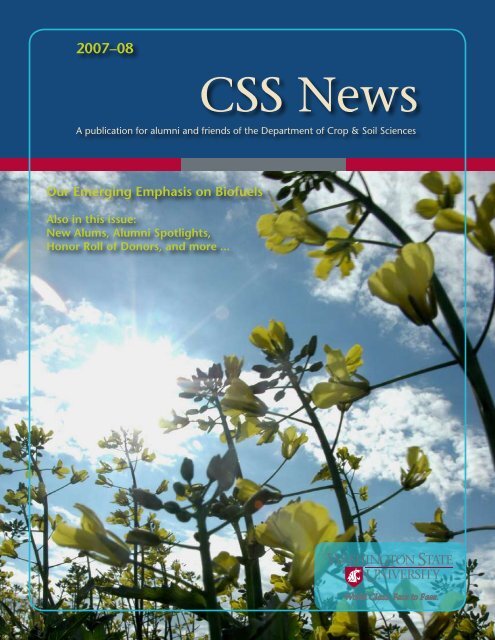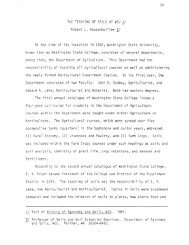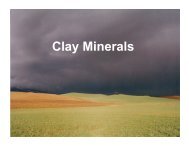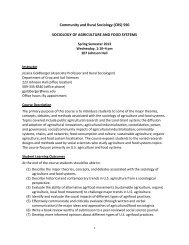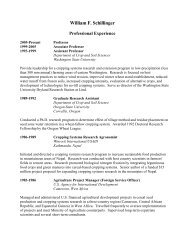CSS News 2007-08 (pdf) - Dept. of Crop and Soil Sciences ...
CSS News 2007-08 (pdf) - Dept. of Crop and Soil Sciences ...
CSS News 2007-08 (pdf) - Dept. of Crop and Soil Sciences ...
Create successful ePaper yourself
Turn your PDF publications into a flip-book with our unique Google optimized e-Paper software.
<strong>2007</strong>–<strong>08</strong><br />
<strong>CSS</strong> <strong>News</strong><br />
A publication for alumni <strong>and</strong> friends <strong>of</strong> the Department <strong>of</strong> <strong>Crop</strong> & <strong>Soil</strong> <strong>Sciences</strong><br />
Our Emerging Emphasis on Bi<strong>of</strong>uels<br />
Also in this issue:<br />
New Alums, Alumni Spotlights,<br />
Honor Roll <strong>of</strong> Donors, <strong>and</strong> more ...
FROM THE CHAIR’S DESK<br />
Nationally ranked<br />
Everyone knows that the Cougar men’s basketball team achieved top 10 rankings for much <strong>of</strong><br />
the first half <strong>of</strong> the <strong>2007</strong>–<strong>08</strong> season, but did you know that according to the Chronicle <strong>of</strong> Higher<br />
Education, our <strong>Crop</strong> Science/Agronomy program is ranked seventh in the nation, <strong>and</strong> second in<br />
the western U.S.? And WSU’s plant sciences program, which many <strong>CSS</strong> faculty are members <strong>of</strong>, is<br />
ranked second nationally? These results are truly a tribute to our terrific faculty, staff, <strong>and</strong> students<br />
that work hard to deliver nationally competitive research, teaching, <strong>and</strong> Extension programs. A key<br />
to our success is addressing Washington’s agricultural issues with<br />
great fundamental science <strong>and</strong> technology transfer.<br />
Bill Pan, <strong>CSS</strong> Chair<br />
It’s a good time to be hitting our stride. WSU’s new president,<br />
Dr. Elson Floyd, is making agriculture a top priority. At our <strong>2007</strong><br />
Spillman Farm Field Day <strong>and</strong> again at the naming <strong>of</strong> the O.A. Vogel Plant <strong>Sciences</strong> building,<br />
President Floyd established an institutional commitment to agriculture in his address to<br />
growers, WSU researchers, <strong>and</strong> legislators. The ball is now in our court to provide leadership<br />
as a major driver <strong>of</strong> Washington agriculture with world class research <strong>and</strong> education.<br />
WSU President Elson Floyd speaking<br />
at Spillman Agronomy Farm Field<br />
Day, July 12, <strong>2007</strong><br />
budget.<br />
Globally networked<br />
Enhanced global leadership is another <strong>of</strong> Dr. Floyd’s major priorities, which <strong>CSS</strong> fulfilled<br />
in <strong>2007</strong> by training students from all over the world, facilitating faculty visits, <strong>and</strong><br />
participating in international projects.<br />
Keynote seminar speakers included Dr. Daniel Hillel, internationally renowned<br />
environmentalist, historian, <strong>and</strong> soil physicist, <strong>and</strong> Dr. Thomas Lumpkin, former <strong>CSS</strong><br />
faculty <strong>and</strong> department chair, current Director General <strong>of</strong> the World Vegetable Center,<br />
<strong>and</strong> future Director General <strong>of</strong> the International Maize <strong>and</strong> Wheat Improvement Center<br />
(referred to as CIMMYT, which is derived from the Spanish version <strong>of</strong> the name).<br />
Kim Campbell, USDA wheat geneticist <strong>and</strong> adjunct <strong>CSS</strong> faculty, continued to lead a<br />
collaboration with CIMMYT <strong>and</strong> agriculturalists in Central Asia <strong>and</strong> the Caucasus. John<br />
Brabb, <strong>CSS</strong> financial manager, effectively managed this very complicated international<br />
<strong>CSS</strong> alumni Chris Pannkuk (Ph.D. <strong>Soil</strong> Science ’94), director <strong>of</strong> WSU International Programs; Mike Barber, director <strong>of</strong> WSU’s<br />
Water Research Center; John Winder, associate dean <strong>and</strong> director <strong>of</strong> WSU Extension; <strong>and</strong> I attended a planning session in<br />
Amman, Jordan, before organizing a contingency <strong>of</strong> <strong>CSS</strong> faculty to support a multi-institutional USDA-funded project to<br />
“Rebuild Agricultural Extension in Iraq.” An education program on soil testing was delivered to 100 Iraqi Extension personnel<br />
in Egypt by Extension weed scientist Bob Parker, Barber, Pannkuk, myself, <strong>and</strong> graduate student Rita Abi-Ghanem, with<br />
support from <strong>CSS</strong> alumni Hesham Abdou (Ph.D. <strong>Soil</strong> Science ’03) <strong>and</strong> Oumarou Badini (Ph.D. <strong>Soil</strong> Science ’07). A second<br />
program on fertilizer management, composting, <strong>and</strong> participatory breeding was delivered in Syria to 30 Iraqi Extension<br />
personnel by Rich Koenig, Pannkuk, Abi-Ghanem, <strong>and</strong> Kevin Murphy (Ph.D. <strong>Crop</strong> Science ’07), currently a research associate<br />
in Stephen Jones’ winter wheat breeding program at WSU. Additional trainings are being planned for 20<strong>08</strong>.<br />
Changing faces<br />
It’s challenging <strong>and</strong> exhilarating to keep moving forward in a rapidly changing<br />
world. Shifting overseas <strong>and</strong> domestic markets, dramatic changes in the economics<br />
<strong>and</strong> environmental implications <strong>of</strong> farming, <strong>and</strong> new dem<strong>and</strong>s for agricultural<br />
products all require that we stay flexible <strong>and</strong> adaptable. Most recently we hired<br />
Michael Neff (Ph.D. Botany ’95, University <strong>of</strong> Washington), a crop biotechnologist<br />
from Washington University in St. Louis, to research the fundamental plant<br />
processes involved in plant biomass yields, bi<strong>of</strong>uels, <strong>and</strong> bioproducts, as well as<br />
teach courses in plant biotechnology. Ann-Marie Fortuna (Ph.D. <strong>Soil</strong> Science ’01,<br />
Michigan Stage University), a soil biologist from USDA-ARS in Maine, also joined us<br />
in <strong>2007</strong> to conduct molecular biology studies <strong>of</strong> N cycling <strong>and</strong> other soil functions<br />
Michael Neff Ann-Marie Fortuna<br />
important in sustainable cropping systems. In addition, she teaches courses in soil biology <strong>and</strong> soil microbiology/<br />
biochemistry. Fortuna replaces long-time faculty member David Bezdicek, who retired in 2004.<br />
Time to catch our breath? No way. Suddenly the foundation <strong>of</strong> our wheat breeding <strong>and</strong> variety development team shifted when<br />
Kim Kidwell was hired in August <strong>2007</strong> as Associate Dean <strong>of</strong> CAHNRS Academic Programs. She graciously agreed to serve as<br />
interim spring wheat breeder until we refill the position. With this transition, Kidwell culminates a stellar career as a productive<br />
From the Chair<br />
2<br />
Continued on Page 10
IN THIS ISSuE ...<br />
Special Feature<br />
Our emerging emphasis on bi<strong>of</strong>uels ........ 3<br />
Student <strong>and</strong> Alumni Update<br />
New alumni ............................................. 6<br />
Student awards ........................................ 6<br />
Scholarships ............................................. 7<br />
Alumni spotlights ........................... 7, 8, 12<br />
Faculty <strong>and</strong> Staff Honors<br />
<strong>and</strong> Awards .......................................... 9<br />
Donor Roll .......................................... 11<br />
About <strong>CSS</strong> <strong>News</strong> ...<br />
<strong>CSS</strong> <strong>News</strong> is the annual Department <strong>of</strong><br />
<strong>Crop</strong> <strong>and</strong> <strong>Soil</strong> <strong>Sciences</strong> alumni newsletter<br />
highlighting teaching, research, <strong>and</strong> Extension<br />
activities, as well as our faculty, staff,<br />
students, <strong>and</strong> alumni. Your suggestions for<br />
stories are welcome. Please send feedback<br />
to Bill Pan, Chair (wlpan@wsu.edu).<br />
Writers/editors:<br />
Kathy Barnard, Desiree Kiliz, Debra Marsh,<br />
Bill Pan, Dora Rollins, Hillary Templin<br />
Graphic Designer:<br />
Melissa Strong<br />
Cover photo:<br />
Canola skies, courtesy <strong>of</strong> the USDA Natural<br />
Resources Conservation Service<br />
You can visit the department online at<br />
http://css.wsu.edu.<br />
Our Emerging Emphasis<br />
on Bi<strong>of</strong>uels<br />
Global increases in energy dem<strong>and</strong> over supply, combined with<br />
environmental concerns, have turned the spotlight on bi<strong>of</strong>uels<br />
produced from crops. In response to public appeal for home-grown<br />
bi<strong>of</strong>uels, the Washington State legislature <strong>and</strong> state agencies turned<br />
to WSU research <strong>and</strong> Extension programs to help make that happen.<br />
At <strong>CSS</strong> we are starting at square one by evaluating <strong>and</strong> adapting<br />
alternative crop feedstocks; next comes integrating them into existing<br />
cropping systems, producing them economically <strong>and</strong> sustainably<br />
without outcompeting food production, <strong>and</strong> in the end ensuring we<br />
develop systems that result in a positive energy balance! We embark on<br />
this mission with cautious optimism, <strong>and</strong> with full knowledge that any<br />
real progress will require a sustained global commitment to the vision.<br />
BuILDING BIOMASS<br />
<strong>Crop</strong>s on steroids<br />
Michael Neff, assistant pr<strong>of</strong>essor <strong>of</strong> crop biotechnology, is studying<br />
how plants regulate steroid hormone levels to modulate their size<br />
<strong>and</strong> stature. His work could lead to dramatically increased yields in<br />
a variety <strong>of</strong> crop plants, including those used to create bi<strong>of</strong>uels <strong>and</strong><br />
bioproducts.<br />
Specifically, Neff is using Arabidopsis, an easy-to-grow plant with a<br />
fully-sequenced genome, to better underst<strong>and</strong> how plants use light<br />
as a source <strong>of</strong> information <strong>and</strong> how the signaling pathways activated<br />
by light interact with plant hormone pathways to influence a plant’s<br />
height <strong>and</strong> heft.<br />
“These brassino-steroids have the potential to increase yield in crop<br />
plants because they have the same structure in all plants,” Neff said.<br />
“If we identify an enzyme that inactivates the steroid, we can target<br />
that enzyme, remove it, <strong>and</strong> allow the increased steroid levels to help<br />
the plant bulk up.”<br />
Working with wheat worldwide<br />
Kulvinder Gill, who holds the O.A.<br />
Vogel Endowed Chair in Wheat<br />
Breeding <strong>and</strong> Genetics, hypothesizes<br />
that some lines <strong>of</strong> wheat yield more<br />
ethanol than others because <strong>of</strong><br />
differences in straw composition.<br />
Gill is analyzing the lignin <strong>and</strong><br />
cellulose content <strong>of</strong> more than<br />
800 lines from every major wheat<br />
breeding program worldwide. His<br />
next step is to group them according<br />
to high cellulose, low cellulose, high<br />
lignin, <strong>and</strong> low lignin content. From<br />
Kulvinder Gill<br />
each <strong>of</strong> those classes, he will take<br />
representative samples <strong>and</strong> produce<br />
ethanol to identify any differences.<br />
Once a line is identified with the right composition <strong>of</strong> cellulose<br />
<strong>and</strong> lignins, those genes can be transferred to the best Northwest<br />
Bi<strong>of</strong>uels<br />
3<br />
Continued on Page 4
Bi<strong>of</strong>uels<br />
wheat varieties—a process that would take just two years,<br />
according to Gill.<br />
Giant pay<strong>of</strong>fs with giant reed<br />
Robert Stevens, director <strong>of</strong> the Irrigated Agriculture<br />
Research <strong>and</strong> Extension Center at Prosser, <strong>and</strong> Bill Pan<br />
are studying the growth habits <strong>and</strong> characteristics <strong>of</strong> giant<br />
reed (Arundo donax), which is a vigorous riparian weed<br />
throughout much <strong>of</strong> the southern U.S., for possible use in<br />
paper production, conversion to ethanol, <strong>and</strong> as a direct<br />
fuel source in gasification.<br />
“Giant reed produces an extremely high quantity <strong>of</strong> shoot<br />
<strong>and</strong> root biomass—well beyond any other known plant,”<br />
said Pan. “As such, its adaption as a crop in irrigated eastern<br />
Washington <strong>and</strong> control management issues are being<br />
evaluated.”<br />
Since the plant does not produce seed <strong>and</strong> is unlikely to<br />
survive without adequate irrigation in a desert environment<br />
such as the Columbia Basin, cultivated Arundo is unlikely to<br />
spread as long as it is transported in closed systems.<br />
Bob Parker, Extension weed scientist at the Irrigated<br />
Agriculture Research <strong>and</strong> Extension Center at Prosser, is<br />
studying the best methods for controlling feral st<strong>and</strong>s <strong>and</strong><br />
volunteer plants using glysophate.<br />
Switching to switchgrass<br />
Continued from Page 3<br />
Robert Stevens (left) <strong>and</strong> Steve Fransen showing switchgrass trials<br />
Steve Fransen, forage crop specialist at the Irrigated<br />
Agriculture Research <strong>and</strong> Extension Center at Prosser, Robert<br />
Stevens, <strong>and</strong> USDA-ARS scientists Hal Collins <strong>and</strong> Rick<br />
Boydston, are evaluating switchgrass for use in ethanol<br />
production <strong>and</strong> environmental restoration. To be economical<br />
for growers <strong>and</strong> local bi<strong>of</strong>uels production facilities, low-cost,<br />
high-return, sustainable crops are required.<br />
“Initiated in 2002, the switchgrass research plots at Paterson<br />
<strong>and</strong> Prosser in the irrigated lower Columbia Basin <strong>of</strong> central<br />
Washington are the oldest west <strong>of</strong> the Rocky Mountains,”<br />
said Collins. These valued research trials have demonstrated<br />
the production <strong>and</strong> adaptation possibilities <strong>of</strong> this longlived<br />
perennial that does well in warm weather <strong>and</strong> has<br />
deep penetrating roots.<br />
4<br />
In addition to its potential as a source <strong>of</strong> bi<strong>of</strong>uel,<br />
switchgrass may also be a low-cost alternative crop that<br />
can restore degraded soils. In contrast to corn, which<br />
accounts for 90% <strong>of</strong> the domestic ethanol feedstock supply,<br />
switchgrass does not require tillage so soil loss from erosion<br />
is minimized, <strong>and</strong> lower fertilizer requirements <strong>and</strong> fewer<br />
pest issues mean decreased fertilizer <strong>and</strong> pesticide use. Once<br />
established, research indicates that switchgrass can produce<br />
a harvestable biomass under low moisture, making it a<br />
viable option for growers facing water restrictions.<br />
High expectations for tall wheatgrass<br />
USDA-NRCS scientist Mark Stannard is comparing biotypes<br />
<strong>of</strong> the tall wheatgrass that grows in eastern Washington<br />
pastures, CRP fields, <strong>and</strong> wildlife refuge plantings. Some<br />
<strong>of</strong> the original ‘Alkar’ tall wheatgrass pasture plantings<br />
from over 50 years ago are still alive <strong>and</strong> performing well.<br />
However, “‘Alkar’ was never intended to be a bi<strong>of</strong>uel, <strong>and</strong><br />
other tall wheatgrass biotypes might prove superior to this<br />
old vanguard,” said Stannard.<br />
Tall wheatgrass outperforms all other plants on salinesubirrigated<br />
ground <strong>and</strong> seven tons/acre yields are not<br />
uncommon, but many questions remain unanswered about<br />
growing it for the bi<strong>of</strong>uel industry, including which biotype<br />
is best; if it can be efficiently converted to ethanol, <strong>and</strong> how<br />
much nitrogen, phosphorus, <strong>and</strong> potassium are needed to<br />
maximize productivity.<br />
OILSEED ADAPTATION AND POTENTIAL<br />
Eastern Washington<br />
Oilseed crops have been grown with some success in eastern<br />
Washington, particularly under irrigation, but the yield<br />
variability is high under dryl<strong>and</strong> conditions. Fundamental<br />
information on variety performance <strong>and</strong> best agronomic<br />
practices for the high, intermediate, <strong>and</strong> low-rainfall<br />
agroclimatic zones <strong>of</strong> eastern Washington is needed to<br />
Weed Management in Oilseed <strong>Crop</strong>s<br />
WSU weed scientists Joe Yenish, Ian Burke, <strong>and</strong> Tim<br />
Miller are evaluating various herbicides for weed<br />
control efficacy <strong>and</strong> crop safety in canola, camelina,<br />
<strong>and</strong> yellow mustard via field trials set up across the<br />
state in the four major agroclimatic zones (at Albion,<br />
Davenport, Lind, <strong>and</strong> Snohomish). “This information<br />
is critical to support the pesticide labeling needs <strong>and</strong><br />
exempt emergency uses <strong>of</strong> herbicides in these crops,”<br />
said Yenish.<br />
Weed management for organic canola production is<br />
also being addressed because <strong>of</strong> the large dem<strong>and</strong><br />
for organic canola meal, a protein supplement<br />
for livestock that is in short supply in the Pacific<br />
Northwest. At WSU’s Mount Vernon Northwestern<br />
Washington Research <strong>and</strong> Extension Center, Miller is<br />
testing weed control efficacy in spring-planted canola<br />
using stale seedbeds coupled with flaming or organic<br />
herbicides such as vinegar <strong>and</strong> clove oil.
Canola trials at Othello<br />
clearly establish oilseeds as viable alternative rotation crops<br />
with cereal grain crops.<br />
“Unique climatic conditions are <strong>of</strong> particular importance.<br />
While the oilseed crops that grow over the winter<br />
typically have the best yield potential, getting good st<strong>and</strong>s<br />
established in the fall can be challenging in our dryl<strong>and</strong><br />
conditions,” said Scot Hulbert, Cook Chair for <strong>Crop</strong>ping<br />
Systems Pathology. Along with USDA-ARS scientists David<br />
Huggins <strong>and</strong> Frank Young, Hulbert is conducting a large<br />
germplasm screening <strong>of</strong> several Brassica species, including<br />
canolas <strong>and</strong> mustards, to examine their ability to survive as<br />
small plants through a variety <strong>of</strong> precipitation levels <strong>and</strong> air<br />
temperatures. Regional research trials at Pullman, Ralston,<br />
Othello, Okanogan, <strong>and</strong> Reardon will then determine those<br />
cultivars most adaptable by rainfall zone <strong>and</strong> best planting<br />
dates <strong>and</strong> methods. The most promising cultivars will<br />
continue on in evaluations for seed yield potential, as well<br />
as oil yield <strong>and</strong> quality.<br />
<strong>Soil</strong> Fertility Management<br />
in Oilseed <strong>Crop</strong>s<br />
WSU soil scientists Richard Koenig, Robert Stevens,<br />
<strong>and</strong> Bill Pan are conducting studies to gather<br />
baseline information on canola <strong>and</strong> camelina nutrient<br />
requirements <strong>and</strong> management because “biomass<br />
accumulation <strong>and</strong> nutrient uptake patterns over the<br />
lifecycle <strong>of</strong> a crop can provide valuable insight into<br />
nutrient needs,” according to Koenig.<br />
The team is also conducting trials to optimize the rate<br />
<strong>and</strong> timing <strong>of</strong> applying major nutrients to canola <strong>and</strong><br />
camelina. Sulfur is known to ensure high canola <strong>and</strong><br />
other brassica crop seed yields, but little is known on<br />
how nitrogen <strong>and</strong> sulfur fertility affect oil yield <strong>and</strong><br />
quality. Ian Burke will analyze seed from the trials to<br />
fill in this data gap.<br />
This work will provide growers with the knowledge<br />
needed to make economic-based fertility<br />
management decisions to achieve optimum yield <strong>and</strong><br />
bi<strong>of</strong>uel quality from oilseed crops.<br />
5<br />
Tim Smith, research technician, inspects camelina trials at the Lind<br />
dryl<strong>and</strong> field station<br />
Trials with camelina, a rugged Brassica relative cultivated in<br />
ancient times, are also being conducted across Washington’s<br />
dryl<strong>and</strong>s to determine the relative performance <strong>of</strong> winter <strong>and</strong><br />
spring cultivars as well as the best varieties for each region.<br />
Bill Schillinger, cropping systems scientist, is initiating a<br />
comprehensive cropping systems study at Lind to compare the<br />
traditional 2-year winter wheat–summer fallow rotation with a<br />
3-year winter wheat–camelina–summer fallow rotation.<br />
Central Washington<br />
High oil-yield safflower plants<br />
An Hang, specialty crops research agronomist, Steven<br />
Fransen, <strong>and</strong> USDA-ARS scientists Hal Collins, Rick<br />
Boydston, <strong>and</strong> Ashok Alva, have initiated a series <strong>of</strong><br />
trials evaluating spring <strong>and</strong> winter canola/rapeseed,<br />
mustard, sunflower, safflower, soybean, <strong>and</strong> camelina in<br />
the irrigated cropping zones <strong>of</strong> central Washington.<br />
The interdisciplinary team is looking at the basic<br />
agronomics <strong>of</strong> how these plants are established, including<br />
their fertility <strong>and</strong> irrigation requirements. In addition,<br />
Bi<strong>of</strong>uels<br />
Continued on Page 10
STUDENT AWARDS<br />
Julie Dawson, <strong>Crop</strong> Science Ph.D. c<strong>and</strong>idate in the winter<br />
wheat breeding program, won the <strong>2007</strong> Distinguished<br />
Service Learning Award from the WSU Center for Civic<br />
Engagement for her active involvement with the Palouse<br />
Food Project, a coalition <strong>of</strong> community groups working on<br />
hunger issues in Whitman County. Dawson organized <strong>and</strong><br />
coordinated student-run gardens at the Pullman Community<br />
Gardens (Koppel Farm) <strong>and</strong> St. James Episcopal<br />
Church to get the produce from these gardens to food<br />
banks in Pullman.<br />
Matt Williams, <strong>Crop</strong> Science M.S. c<strong>and</strong>idate, took second<br />
place in the graduate student paper contest at the March<br />
<strong>2007</strong> Western Society <strong>of</strong> Weed Science Conference for his<br />
presentation titled “Mesotrione Impregnated Fertilizer<br />
for Weed Control during Turfgrass Establishment.” Maria<br />
Lockard, <strong>Crop</strong> Science B.S. c<strong>and</strong>idate, placed first in the<br />
undergraduate poster competition with “Investigation into<br />
Prickly Lettuce Tolerance <strong>of</strong> 2,4-D <strong>and</strong> Glysophate.”<br />
CAHNRS Awards<br />
Robert Brulotte (B.S. <strong>Crop</strong> Science–Turf Management ’06,<br />
summa cum laude), Michael Cassara<br />
(B.S. Agriculture–Education ’07), <strong>and</strong><br />
Josh Knodel (B.S. Ag. Technology &<br />
Management ’07) were each named<br />
CAHNRS Outst<strong>and</strong>ing Seniors in their<br />
respective majors. After graduating,<br />
Brulotte, a returning student from 1997,<br />
accepted a first assistant superintendent<br />
position with Sudden Valley Golf<br />
Course near Bellingham. Cassara, whose<br />
lifelong ambition is to teach agriculture,<br />
Josh Knodel<br />
is continuing his education with us in<br />
pursuit <strong>of</strong> a Master’s degree. Entering<br />
WSU as a Dean’s Merit scholarship recipient, Knodel<br />
accepted a position with the John Deere Corporation.<br />
Chris Proctor (B.S. <strong>Crop</strong> Science–Turf Management ’07,<br />
summa cum laude) was named the American Society <strong>of</strong><br />
Agronomy–<strong>Crop</strong> Science Society <strong>of</strong> America–<strong>Soil</strong> Science<br />
Society <strong>of</strong> America Outst<strong>and</strong>ing Senior. He is also staying<br />
on at WSU as an M.S. c<strong>and</strong>idate in the same field.<br />
Lauren Hubbard (B.S. <strong>Soil</strong> Science, B.A. Women’s Studies,<br />
B.A. Communication ’07, magna cum laude) was named<br />
CAHNRS Outst<strong>and</strong>ing Senior in <strong>Soil</strong> Science, Aggie <strong>of</strong> the<br />
Year, <strong>and</strong> the all-around outst<strong>and</strong>ing senior. Hubbard was<br />
also awarded the WSU Martin Luther King Distinguished<br />
Service Award in<br />
January <strong>2007</strong>, <strong>and</strong><br />
served as a 2006<br />
Model United Nations<br />
representative. Upon<br />
graduation, Hubbard<br />
joined the Peace Corp.<br />
All CAHNRS award<br />
recipients were<br />
recognized at the<br />
annual CAHNRS<br />
awards banquet in<br />
April <strong>2007</strong>.<br />
Bill Pan, <strong>CSS</strong> Chair, congratulating<br />
Lauren Hubbard, <strong>2007</strong> Aggie <strong>of</strong> the Year<br />
6<br />
WELCOME NEW ALUMS<br />
MAy <strong>2007</strong> GRADuATES<br />
Laylah Bewick, M.S. ......................................... <strong>Crop</strong> Science<br />
James Bonner, B.S. ........................................... <strong>Crop</strong> Science<br />
Noah Bonds, M.S............................................... <strong>Soil</strong> Science<br />
Michael Cassara, B.S. ........................Agriculture (education)<br />
Bryan Englund, B.S. ............Ag. Technology & Management<br />
Tanyalee Erwin, M.S. ........................................... Agriculture<br />
Tracy Hanger, B.S. ............................................ <strong>Crop</strong> Science<br />
Lori Hoagl<strong>and</strong>, Ph.D. ......................................... <strong>Soil</strong> Science<br />
Lauren Hubbard, B.S. ......................................... <strong>Soil</strong> Science<br />
(magna cum laude)<br />
Ben Keno, B.S. ................................................. <strong>Crop</strong> Science<br />
Brady Kiesz, B.S. .................Ag. Technology & Management<br />
Craig Kincaid, B.S. ..............Ag. Technology & Management<br />
Josh Knodel, B.S. .................Ag. Technology & Management<br />
Suzanne Kopan, M.S. ....................................... <strong>Crop</strong> Science<br />
Kevin Murphy, Ph.D. ........................................ <strong>Crop</strong> Science<br />
R<strong>and</strong>i Nickels, B.S. ...........................Agriculture (education)<br />
(summa cum laude)<br />
Kai Pang, B.S. .................................................. <strong>Crop</strong> Science<br />
Owen Peth, B.S. ..................Ag. Technology & Management<br />
Kevin Smith, B.S. ............................................. <strong>Crop</strong> Science<br />
Kari Stenshol, B.S. ...............Ag. Technology & Management<br />
Denine Trump, M.S. ........................................... Agriculture<br />
Carl Walker, M.S. ............................................. <strong>Crop</strong> Science<br />
AuGuST <strong>2007</strong> GRADuATES<br />
Lauren Hair, B.S. .............................................<strong>Crop</strong> Science<br />
Kristy Ott, M.S. .................................................<strong>Soil</strong> Science<br />
Chris Proctor, B.S. ..........................................<strong>Crop</strong> Science<br />
(summa cum laude)<br />
Jennifer Reeve, Ph.D. ........................................<strong>Soil</strong> Science<br />
Susan Richards, M.S. ..........................................Agriculture<br />
Steven Smith, M.S. ............................................Agriculture<br />
Matthew Stowe, M.S. .......................................<strong>Soil</strong> Science<br />
Br<strong>and</strong>on Wilhelm, B.S. ....................................<strong>Crop</strong> Science<br />
DECEMBER <strong>2007</strong> GRADuATES<br />
Joshua Fitts, B.S. ............... Ag. Technology & Management<br />
Joe Hill, B.S. ....................................................<strong>Crop</strong> Science<br />
Christy Ludwigsen, B.S. .................. Agriculture (education)<br />
Jackqueline Madill, M.S. .....................................Agriculture<br />
Jasdeep Mutti, Ph.D. .......................................<strong>Crop</strong> Science<br />
Alan Petro, B.S. ................. Ag. Technology & Management<br />
Zachary Rashford, B.S. ...... Ag. Technology & Management<br />
Aubrey Reeves, B.S.......................... Agriculture (education)<br />
William Simons, B.S. .......................................<strong>Crop</strong> Science<br />
Justin Stone, B.S. ............... Ag. Technology & Management<br />
John Wisse, B.S. ................ Ag. Technology & Management<br />
Kyle Young, B.S...............................................<strong>Crop</strong> Science
<strong>CSS</strong> ACADEMIC SCHOLARSHIPS <strong>2007</strong>-<strong>08</strong><br />
Bertramson Student Travel Fund<br />
<strong>2007</strong> <strong>CSS</strong> Graduate Student State<br />
Agriculture Tour—13 students<br />
participated<br />
Roscoe <strong>and</strong> Frances Cox<br />
Scholarship<br />
Rita Abi-Ghanem<br />
Megan Alcott<br />
David Andrews<br />
Doug Collins<br />
Jennifer Crupper<br />
Catherine Crosby<br />
Katie Dale<br />
Cherie Flint<br />
Shaun Knutzen<br />
Cynthia Krcma<br />
Emily Meirik<br />
Sindhu Nair<br />
Triven Pillai<br />
Chad Platt<br />
Philip Roberts<br />
Michael Sellman<br />
Dilpreet Singh<br />
Kulbir Singh<br />
Upinder Singh Gill<br />
Dustin Walsh<br />
Matthew Williams<br />
Estate <strong>of</strong> Elizabeth M. Felgenhauer<br />
Katie Dale<br />
Cherie Flint<br />
Cynthia Krcma<br />
Dustin Walsh<br />
Roy L. Goss Turfgrass Scholarship<br />
David Andrews<br />
Katie Dodson<br />
Shaun Knutzen<br />
Chad Platt<br />
Michael Sellman<br />
Matt Williams<br />
Kyle Young<br />
Mrs. Frank Greeley-Federation <strong>of</strong><br />
Garden Clubs Scholarship<br />
Cynthia Krcma<br />
Max Hinrichs, Jr. Scholarship<br />
Megan Alcott<br />
Max Hinrichs, Sr. Scholarship<br />
Megan Alcott<br />
C. Dawson Moodie Memorial<br />
Scholarship<br />
Katie Dale<br />
Thomas <strong>and</strong> Catherine Hylsop<br />
Graduate Fellowship<br />
Arron Carter<br />
Grant Poole<br />
Reynolds-Biersner Scholarship<br />
Br<strong>and</strong>on Arnold<br />
Katie Dale<br />
Cherie Flint<br />
Tracy Hanger<br />
June Roberts Agriculture<br />
Scholarship<br />
Erinn Argo<br />
Jacob Bredstr<strong>and</strong><br />
Michael Boer<br />
Samantha Clark<br />
Grant DeVries<br />
Katie Detering<br />
Gregory Emtman<br />
Michael Hughes<br />
Evan Jones<br />
Brian Kiesz<br />
Luke Korthuis<br />
Garrett Linstrum<br />
Sophie Mayate<br />
Jacqueline Meyer<br />
Tyler Ruzicka<br />
Weston Sellars<br />
Kent Stokes<br />
Rachel Teel<br />
Heath Wilson<br />
Adam Zediker<br />
D.W. Steiger Family Graduate<br />
Fellowship<br />
Arron Carter<br />
Grant Poole<br />
Upinder Singh Gill<br />
Tracy Vincent Sharp Memorial<br />
Scholarship<br />
Megan Alcott<br />
Tracy Hanger<br />
O.A. Vogel Washington State<br />
<strong>Crop</strong> Improvement Association<br />
Scholarship<br />
Dustin Walsh<br />
Washington–North Idaho Seed<br />
Association Scholarship<br />
Nicole Groth<br />
Cynthia Krcma<br />
Don Schlect<br />
7<br />
Hill slides into<br />
career, national<br />
award<br />
Joe Hill (B.S. <strong>Crop</strong> Science–Turf<br />
Management<br />
’07) won one<br />
<strong>of</strong> four <strong>2007</strong><br />
Sports Turf<br />
Managers<br />
Association<br />
National Field<br />
<strong>of</strong> the Year<br />
awards for<br />
short-season<br />
Class A minor<br />
league baseball.<br />
The award<br />
recognizes both a facility’s<br />
Joe Hill<br />
excellence <strong>and</strong> the sports turf<br />
manager’s expertise in his or her<br />
field.<br />
Winning this award was quite<br />
a feat for the Coeur d’Alene,<br />
Idaho, native. Hill worked as<br />
turf manager for the Spokane<br />
Indians while attending classes<br />
in Pullman. He credits the<br />
important people in his life <strong>and</strong><br />
the education he received for his<br />
successes.<br />
“My parents were a large part <strong>of</strong><br />
my success—they’ve always been<br />
supportive. My peers, advisor,<br />
<strong>and</strong> pr<strong>of</strong>essors at WSU <strong>and</strong> those<br />
who worked with me at the<br />
Indians also made a huge impact<br />
with what they taught me,” said<br />
Hill. “I chose to come to WSU<br />
because it has a great turfgrass<br />
management program <strong>and</strong> a rich<br />
tradition. It also helped that the<br />
campus is close to home.”<br />
For Hill, this award marks the<br />
beginning <strong>of</strong> an ambitious<br />
career. He is now at The Club<br />
at Black Rock, a private golf<br />
course in Coeur d’Alene. “This<br />
new position <strong>of</strong>fers me a great<br />
opportunity <strong>and</strong> hopefully<br />
will open a few doors in the<br />
golf industry <strong>and</strong> possibly my<br />
future,” said Hill. “I hope I can<br />
make a positive name for myself<br />
in the industry, but I would like<br />
nothing more than to be happy<br />
with success, wealth, <strong>and</strong> a<br />
family.”
Riechers holds double<br />
ACES faculty awards<br />
Dean Riechers (Ph.D. <strong>Crop</strong> Science ’96),<br />
associate pr<strong>of</strong>essor <strong>of</strong> weed science physiology<br />
in the College <strong>of</strong> Agricultural, Consumer <strong>and</strong><br />
Environmental <strong>Sciences</strong><br />
(ACES) at the University<br />
<strong>of</strong> Illinois at Urbana-<br />
Champaign (UIUC),<br />
received the 20<strong>08</strong> College<br />
<strong>of</strong> ACES Faculty Award for<br />
Excellence in Research.<br />
He was nominated by his<br />
colleague, Dr. Aaron Hager.<br />
It was only in 2004 that<br />
Riechers received the<br />
teaching counterpart to<br />
this award. “Having been<br />
Dean Riechers<br />
nominated by my peers <strong>and</strong><br />
selected to receive both <strong>of</strong><br />
these awards is very special <strong>and</strong> rewarding,”<br />
said Riechers, who earned both a B.S. in<br />
agricultural sciences <strong>and</strong> an M.S. in agronomy/<br />
weed science from UIUC.<br />
Riechers joined WSU weed scientist Patrick<br />
Fuerst’s research program in 1992. Riechers’<br />
Ph.D. project involved herbicide safeners<br />
(chemical compounds that protect cereal crops<br />
against injury from herbicides) for winter wheat<br />
as a possible way to selectively control jointed<br />
goatgrass.<br />
Later in his thesis program, winter wheat<br />
breeder Stephen Jones suggested Riechers<br />
include wild wheat relatives in his research,<br />
which led to some interesting discoveries about<br />
wheat’s ancestral relationships <strong>and</strong> genome<br />
contribution to gene expression.<br />
Riechers’ graduate committee was composed<br />
<strong>of</strong> several outst<strong>and</strong>ing scientists <strong>and</strong> mentors,<br />
including Stephen Jones, Patrick Fuerst,<br />
retired crop physiologist Robert Warner, <strong>and</strong><br />
molecular plant scientist Rodney Croteau.<br />
“Each committee member brought something<br />
unique to the project regarding their individual<br />
areas <strong>of</strong> expertise,” said Riechers. “I feel very<br />
fortunate to have joined the department when<br />
I did.”<br />
At UIUC Riechers is building on the research<br />
he conducted at WSU—working toward<br />
greater underst<strong>and</strong>ing <strong>of</strong> the biochemical<br />
<strong>and</strong> molecular basis for herbicide selectivity<br />
between crops <strong>and</strong> weeds to achieve enhanced<br />
management effectiveness <strong>and</strong> broader<br />
application.<br />
L-R: Rick Adams, son Ricky Adams, <strong>and</strong> WSU President Elson Floyd<br />
8<br />
Adams named <strong>2007</strong> WSU<br />
Dad <strong>of</strong> the Year<br />
WSU alum <strong>and</strong> father <strong>of</strong> four Rick Adams (B.S.<br />
Agriculture–Education ’75) was named WSU Dad <strong>of</strong><br />
the Year for <strong>2007</strong> based in part on his son Ricky’s<br />
nomination.<br />
June 20<strong>08</strong> will mark both Adam’s retirement <strong>and</strong> 33<br />
years <strong>of</strong> FFA teaching <strong>and</strong> advising at Prosser High<br />
School, which has one <strong>of</strong> the largest FFA programs in the<br />
state.<br />
Adams’ decision to become a high school agricultural<br />
education teacher was a “Coug to Coug” situation. “My<br />
ag ed teacher, Roy Hallstrom, was a WSU alum, <strong>and</strong> he<br />
motivated me to pursue this field,” said Adams. “I saw<br />
what he did for other kids, <strong>and</strong> thought if I could do<br />
what he did, it would be a great way to spend a career.”<br />
Adams grew up on a small apple farm in Cowiche.<br />
He chose WSU to earn his bachelor’s degree because<br />
“that was where ag ed was, <strong>and</strong> I always wanted to<br />
be a Cougar.” Once he arrived in Pullman he found a<br />
challenging curriculum <strong>and</strong> an extended family, many<br />
in the Phi Kappa Sigma fraternity he joined. “WSU was<br />
just a big family, <strong>and</strong> we developed so many close ties,”<br />
Adams remembers. “The friendships you make [at WSU]<br />
can last a lifetime.”
Faculty <strong>and</strong> Staff Honors <strong>and</strong> Awards<br />
Mary Kate Alex<strong>and</strong>er, principal assistant to the <strong>CSS</strong> chair, received the <strong>2007</strong> CAHNRS Administrative Pr<strong>of</strong>essional Staff<br />
Excellence Award. She has worked in the department for nearly 28 years. Ron Bolton, agricultural technologist, received<br />
the <strong>2007</strong> CAHNRS Classified Technical Staff Excellence Award for his support <strong>of</strong> the soil science program as a computer,<br />
lab, <strong>and</strong> field technologist since 1988. Both were recognized at the annual CAHNRS awards banquet in April <strong>2007</strong>.<br />
Tim Miller, associate weed scientist <strong>and</strong> Extension specialist at the WSU Mount Vernon Northwestern Washington<br />
Research <strong>and</strong> Extension Center, received the <strong>2007</strong> Kenneth J. Morrison Extension Award for significant contributions to<br />
agronomic crop production <strong>and</strong> soil management. He was presented the award at the Center’s annual field day in July<br />
<strong>2007</strong>. Carl Libbey, scientific assistant to Miller’s program, received the Outst<strong>and</strong>ing Pr<strong>of</strong>essional Staff Award from the<br />
Western Society <strong>of</strong> Weed Science at their March <strong>2007</strong> annual meeting in Portl<strong>and</strong>, Oregon.<br />
Jim Cook was honored at the Cook Agronomy Farm dedication before an audience <strong>of</strong> 200 at the Precision Agriculture Field<br />
Day’s lunch program on June 28, <strong>2007</strong>. In 2006 the WSU Board <strong>of</strong> Regents voted to name the University’s precision agriculture<br />
<strong>and</strong> direct seed farm north <strong>of</strong> Pullman for Cook, who retired in 2005 after 40 years <strong>of</strong> service to WSU <strong>and</strong> the USDA-ARS.<br />
Bill Pan was named a <strong>2007</strong> Fellow <strong>of</strong> the American Society <strong>of</strong> Agronomy. A soil scientist, Pan joined the <strong>CSS</strong> faculty in<br />
1984 <strong>and</strong> has served as department chair since 2002. His<br />
research focuses on the nutrient cycling <strong>and</strong> root ecology<br />
<strong>of</strong> cereal-based cropping systems. Phil Miklas, research<br />
geneticist with USDA-ARS at the Vegetable <strong>and</strong> Forage <strong>Crop</strong>s<br />
Research Unit in Prosser, <strong>and</strong> <strong>CSS</strong> adjunct faculty, was one <strong>of</strong><br />
10 members named <strong>Crop</strong> Science Society <strong>of</strong> America Fellow<br />
in <strong>2007</strong>. Miklas’ program develops enhanced germplasm lines<br />
<strong>and</strong> improved dry edible bean cultivars. Selection as fellow is<br />
the highest honor the societies can bestow on its members.<br />
Both Pan <strong>and</strong> Miklas were recognized in November <strong>2007</strong> at<br />
the joint annual meetings <strong>of</strong> both societies in New Orleans.<br />
Richard Koenig, soil fertility Extension specialist, was<br />
also recognized by the American Society <strong>of</strong> Agronomy at<br />
the November <strong>2007</strong> New Orleans society meetings with<br />
a certificate <strong>of</strong> excellence for outst<strong>and</strong>ing agronomic<br />
educational material. He co-authored a regional (Montana,<br />
Washington, Idaho) 11-page publication titled “Management<br />
<strong>of</strong> Urea Fertilizer to Minimize Volatilization.”<br />
Steven R. Lyon, a senior scientific assistant in WSU’s<br />
winter wheat breeding program, received the O.A. Vogel<br />
<strong>Crop</strong> Improvement Award on November 13, <strong>2007</strong>, at the annual meeting <strong>of</strong> the Washington State <strong>Crop</strong> Improvement<br />
Association in Pasco. The annual award recognizes those who have made significant contributions to the pure seed<br />
program or crop production in Washington State. Lyon, who has worked for WSU for 15 years, manages all aspects <strong>of</strong> the<br />
winter wheat breeding program on a day-to-day basis, including staff <strong>and</strong> student employees. He also gives talks to grower<br />
groups at field tours, represents the winter wheat breeding program at meetings outside <strong>of</strong> Pullman, <strong>and</strong> writes articles<br />
about the research program for popular media.<br />
Stephen Jones, author <strong>of</strong> the 2009 World Book encyclopedia wheat entry<br />
9<br />
Henry Sh<strong>and</strong>s (left), President <strong>of</strong> the <strong>Crop</strong> Science Society <strong>of</strong> America,<br />
congratulates Phil Miklas, <strong>2007</strong> <strong>CSS</strong>A Fellow<br />
Stephen Jones, winter wheat breeder <strong>and</strong> <strong>CSS</strong> pr<strong>of</strong>essor,<br />
made headlines with his research <strong>and</strong> development <strong>of</strong><br />
perennial wheat in the June 5, <strong>2007</strong>, science section<br />
<strong>of</strong> the New York Times. Jones also recently completed<br />
the “wheat” entry for the 2009 edition <strong>of</strong> World Book<br />
encyclopedia. In addition to updating <strong>and</strong> reviewing<br />
existing information, Jones contributed discussion on the<br />
positive environmental aspects <strong>of</strong> wheat breeding <strong>and</strong><br />
lessening the environmental footprint <strong>of</strong> farming.<br />
Robert Stevens, Extension soil scientist <strong>and</strong> interim<br />
director <strong>of</strong> the Irrigated Agricultural Research <strong>and</strong><br />
Extension Center, received the <strong>2007</strong> Leadership Award at<br />
the biannual Western Nutrient Management <strong>and</strong> Water<br />
Quality conference on March 8, <strong>2007</strong>, in Salt Lake City.<br />
The conference is organized by the Western Education/<br />
Extension <strong>and</strong> Research Activities project committee,<br />
whose purpose is to bring scientists together to coordinate<br />
related research via informal work groups, task forces, <strong>and</strong><br />
symposia for exchange <strong>of</strong> experience <strong>and</strong> opinions.
Bi<strong>of</strong>uels<br />
Value-Added Biopesticides<br />
Several oilseed crops produce chemical compounds<br />
<strong>and</strong> changes in soil microbial communities that<br />
reduce soil-borne pathogens, insects, <strong>and</strong> weed<br />
seedlings. As a result, they benefit growers across<br />
the state by lowering the need for pesticides, which<br />
is particularly promising for organic systems. Lynne<br />
Carpenter-Boggs, BIOAg Coordinator for WSU’s<br />
Center for Sustaining Agriculture <strong>and</strong> Natural<br />
Resources, is evaluating several brassica seedmeals<br />
for potential use as an organic nitrogen fertilizer,<br />
organic pesticide, <strong>and</strong> organic damping-<strong>of</strong>f control in<br />
greenhouses. “Given the current prices for biodiesel<br />
oilseeds, a good market for post-crush seedmeals<br />
would make these crops a lot more economically<br />
attractive,” said Carpenter-Boggs.<br />
the studies involve monitoring plant characteristics<br />
related to yield, nutrition, water use efficiency, <strong>and</strong> oil<br />
concentration <strong>and</strong> chemical composition in the seed.<br />
“We have a holistic view. Agronomics, l<strong>and</strong> stewardship,<br />
<strong>and</strong> environmental, social, <strong>and</strong> economic concerns go<br />
h<strong>and</strong> in h<strong>and</strong>,” said Collins. <strong>Crop</strong>s such as canola <strong>and</strong><br />
safflower have an oil concentration in the 40% range,<br />
while soybean <strong>and</strong> mustard are in the 20% to 30%<br />
range, respectively. <strong>Crop</strong>s with higher oil concentrations<br />
require less acreage to support processing facilities than<br />
those with lower concentrations.<br />
Oilseed crops could contribute to the development<br />
<strong>of</strong> an extremely valuable <strong>and</strong> resilient special oil<br />
<strong>and</strong> bioproducts industry in the Columbia Basin <strong>of</strong><br />
central Washington—similar to the diversified food<br />
processing industry. For example, safflower, canola,<br />
camelina, <strong>and</strong> flax are low in saturated fat, <strong>and</strong> high<br />
in monounsaturated oil content (almost 60%) with<br />
beneficial omega-3 fatty acid compounds; both <strong>of</strong> these<br />
are valuable product components in the burgeoning<br />
From the Chair<br />
10<br />
Dairy cows in western Washington<br />
organic foods market. Alternatively, rapeseed yields oil<br />
suitable for industrial applications such as surfactants,<br />
plastics, cosmetics, <strong>and</strong> lubricants.<br />
Western Washington<br />
Continued from Page 5<br />
The western Washington agricultural l<strong>and</strong>scape is dominated<br />
by dairy, high-value specialty crops, grasses, <strong>and</strong> forest. Farm<br />
size is generally smaller than east <strong>of</strong> the Cascades <strong>and</strong> the<br />
maritime climate <strong>and</strong> complex crop rotations present special<br />
challenges for production <strong>of</strong> oilseed crops.<br />
Tim Miller <strong>and</strong> Craig Cogger, Extension soil scientist at<br />
WSU’s Puyallup Research <strong>and</strong> Extension Center, believe<br />
significant opportunity for canola production exists on<br />
organically certified l<strong>and</strong>. Canola meal, the residual after<br />
the oil is extracted, is an important feed product for organic<br />
dairies, which is a rapidly growing segment <strong>of</strong> Washington’s<br />
dairy industry. Current prices for imported organic<br />
canola meal are three to four times that for conventional<br />
canola meal, representing both an opportunity for valueadded<br />
canola production as well as reduced feed costs<br />
for Washington’s organic dairies. Miller <strong>and</strong> Cogger are<br />
conducting agronomic trials for canola on organically<br />
certified ground at Puyallup to determine optimal timing<br />
<strong>and</strong> nitrogen management for fall <strong>and</strong> spring canola. At<br />
Mount Vernon they are evaluating the seed yield <strong>and</strong> oil<br />
composition <strong>of</strong> safflower, sunflower, flax, <strong>and</strong> camelina.<br />
Continued from Page 2<br />
<strong>and</strong> innovative wheat breeder <strong>and</strong> researcher. She <strong>and</strong> her team released several new varieties widely used by the wheat industry.<br />
Kidwell was also an innovative <strong>and</strong> inspirational educator, <strong>and</strong> fortunately for the students <strong>of</strong> WSU, she vows to maintain some<br />
<strong>of</strong> her classroom teaching. We look forward to working with her in her new leadership role with academic programming.<br />
Another loss, John Burns retired in January 20<strong>08</strong> after completing a 32-year career at WSU. He served 25 years as a<br />
Whitman County agricultural Extension agent, then as the variety testing Extension agronomist for <strong>CSS</strong> since 2000. Burns<br />
did an outst<strong>and</strong>ing job <strong>of</strong> stabilizing <strong>and</strong> improving the quality <strong>of</strong> this essential program that generates <strong>and</strong> communicates<br />
information growers need to make informed variety selection choices. This program is a key interface between <strong>CSS</strong> <strong>and</strong> the<br />
agriculture industry.<br />
We will greatly miss both <strong>of</strong> these colleagues <strong>and</strong> wish them the best in their future endeavors. We now have huge shoes to<br />
fill. Searches are underway to refill both positions <strong>and</strong> we hope to have new faculty in place by fall 20<strong>08</strong>. With the passage<br />
<strong>of</strong> time, the players change but the commitment to excellence <strong>and</strong> quality continues.<br />
—Bill Pan
2006-07 <strong>CSS</strong> HONOR ROLL OF DONORS<br />
In appreciation <strong>of</strong> gifts (>$100) to the Department <strong>of</strong> <strong>Crop</strong> <strong>and</strong> <strong>Soil</strong> <strong>Sciences</strong> from July 1, 2006 to June 30, <strong>2007</strong><br />
Laureates<br />
($1 million or more cumulative)<br />
Anheuser-Busch Companies, Inc.<br />
*Lorenz Bohrnsen<br />
Roy <strong>and</strong> Marcella Goss<br />
Northwest Agricultural Research<br />
Foundation, Inc.<br />
Benefactors<br />
($100,000 or more cumulative)<br />
Alf Christianson Seed Company<br />
Otto <strong>and</strong> Doris Amen<br />
American Malting Barley Association<br />
Applied Phytologics, Inc.<br />
Bayer Corportion<br />
E. Donald <strong>and</strong> Jane Biersner<br />
Busch Agricultural Resources, Inc.<br />
Donna Camp<br />
*Melvin Camp<br />
Ken <strong>and</strong> Sue Christianson<br />
Lucille Christianson<br />
*Ferne Daniel<br />
E.I. Du Pont de Nemours & Company<br />
FMC Corporation<br />
Glen Franklin<br />
Harry <strong>and</strong> Edith Goldsworthy<br />
Catherine Hyslop<br />
*Thomas Hyslop<br />
Gale Kicha<br />
*Allen Manring<br />
*Betty Manring<br />
Northwest Farm Credit Services<br />
Roscoe <strong>and</strong> Frances Cox Charitable Trust<br />
*Wallace Staatz<br />
Donald <strong>and</strong> Bettie Steiger<br />
Patsy Sunderman<br />
Syngenta <strong>Crop</strong> Protection, Inc.<br />
*Gana Vaiana<br />
Washington State Dry Pea & Lentil<br />
Commission<br />
*Leonard Young<br />
Platinum Associates<br />
($10,000 or more annual support)<br />
E. Donald <strong>and</strong> Jane Biersner<br />
Glen Franklin<br />
Organic Center<br />
*Martha Pinney<br />
*Wallace Staatz<br />
Syngenta <strong>Crop</strong> Protection, Inc.<br />
BASF Corporation<br />
Gaylon <strong>and</strong> Judith Campbell<br />
Ken <strong>and</strong> Sue Christianson<br />
Lucille Christianson<br />
E.I. Du Pont de Nemours & Company<br />
Harry <strong>and</strong> Edith Goldsworthy<br />
International Plant Nutrition Institute<br />
Lesco Services, Inc.<br />
Donald <strong>and</strong> Bettie Steiger<br />
Crimson Associates<br />
($5,000 to $9,999 annual support)<br />
Aquatrols Corporation <strong>of</strong> America<br />
Bayer <strong>Crop</strong>Science, LP<br />
Cheminova, Inc.<br />
Decagon Devices, Inc.<br />
Georgia-Pacific Chemicals, LLC<br />
Glenn Leitz<br />
Silver Associates<br />
($2,500 to $4,999 annual support)<br />
AMVAC Chemical Corporation<br />
Bayer <strong>Crop</strong> Science<br />
Cleary Chemical Corporation<br />
*Elizabeth Felgenhauer<br />
Fluid Fertilizer Foundation<br />
Gowan Seed Company, LLC<br />
National Pork Board<br />
Washington State Hay Growers<br />
Association<br />
Washington–North Idaho Seed Association<br />
President’s Associates<br />
($1,000 to $2,499 annual support)<br />
Agrium U.S., Inc.<br />
Robert <strong>and</strong> Carolyn Allan<br />
Paul <strong>and</strong> Bonnie Bawel<br />
Donna Camp<br />
Campbell Scientific, Inc.<br />
R. James <strong>and</strong> Beverly Cook<br />
Crites Moscow Growers, Inc.<br />
Norman Donaldson<br />
Monsanto Company<br />
James <strong>and</strong> Ann Moore<br />
William Pan <strong>and</strong> Vicki McCracken<br />
ProGene, LLC<br />
Tilth Producers <strong>of</strong> Washington<br />
Dietrich <strong>and</strong> Penny Von Wettstein<br />
Washington State FFA Association<br />
Claudia Wilhelm<br />
Yakima Klickitat County Association <strong>of</strong><br />
Wheat Growers<br />
Bryan Society<br />
($500 to $999 annual support)<br />
Exactrix Global Systems<br />
Curtis Gering<br />
Michael <strong>and</strong> Betty Leinweber<br />
Micros<strong>of</strong>t Corporation<br />
Scotts Company<br />
Wilbur-Ellis Company<br />
11<br />
Tower Club<br />
($100 to $499 annual support)<br />
Agpro<br />
Bank <strong>of</strong> Whitman<br />
Stanton <strong>and</strong> JoAnn Brauen<br />
Xiwen Cai<br />
Climate Solutions<br />
Colfax Grange Supply Company, Inc.<br />
Connell Grain Growers<br />
Connell Oil, Incorporated<br />
Cooperative Agricultural Producers, Inc.<br />
Franklin County Wheat Growers<br />
Great Plains Manufacturing, Inc.<br />
Dana <strong>and</strong> Valerie Herron<br />
James <strong>and</strong> Doris Howell<br />
Carl <strong>and</strong> Beverly Jensen<br />
Stephen Jones<br />
Kimberlee Kidwell<br />
Kile Machine & Manufacturing, Inc.<br />
Andris <strong>and</strong> Jolanta Kleinh<strong>of</strong>s<br />
Richard Koenig<br />
Joseph Majka<br />
McGregor Company<br />
Alex <strong>and</strong> Linda McGregor<br />
Alan <strong>and</strong> Jacqueline McKay<br />
Timothy Miller<br />
Fred <strong>and</strong> Linda Muehlbauer<br />
National Center for Appropriate<br />
Technology<br />
North Pine AG Equipment, Inc.<br />
Nu Chem Limited<br />
Wesley <strong>and</strong> Mary Lee Nuxoll<br />
Pacific NW Direct Seed Association<br />
Palouse Welding & Machine, Inc.<br />
R<strong>and</strong>all <strong>and</strong> Sue Parker<br />
PCI Industries, Inc.<br />
Gary <strong>and</strong> Geraldine Picha<br />
Timothy <strong>and</strong> Megan Riebe<br />
Ritzville Chemicals, Inc.<br />
Ritzville Warehouse Company<br />
James <strong>and</strong> Nancy Ruark<br />
St. John Hardware & Implement<br />
Company<br />
C. Robert <strong>and</strong> Shirley E. Staib<br />
David Stout<br />
Michael <strong>and</strong> Gail Swan<br />
Guy Swanson<br />
James <strong>and</strong> Jeanne Tribbett<br />
Union Elevator & Warehouse<br />
Uniontown Co-Operative Association<br />
Dennis <strong>and</strong> Carol Wallace<br />
Westbred, LLC<br />
Western Farm Service, Inc.<br />
Wilbur-Ellis Company<br />
_________________________________<br />
*Indicates deceased
Lupkes hits a long drive—back to Pullman<br />
Todd Lupkes’ (B.S. <strong>Crop</strong> Science–Turfgrass Management<br />
’92) return to the Palouse began soon after receiving<br />
word <strong>of</strong> a job opening late one Friday night, with a<br />
Monday closing date. Six days, six hundred miles, <strong>and</strong><br />
one unfortunate deer later, Lupkes’ wife knew it. “We’re<br />
moving to Pullman, aren’t we?” she intuited as he walked<br />
in the door <strong>of</strong> his Gig Harbor home.<br />
Days later, Lupkes was hired as superintendent <strong>of</strong> the<br />
Palouse Ridge Golf Club by CourseCo, the golf course<br />
management company WSU contracted to build a<br />
premier 18-hole, Scottish-links style golf course. The<br />
course is scheduled to open in August 20<strong>08</strong>.<br />
“Ten months later I still have goose bumps. I can’t<br />
even describe it—everything happened so fast,” said<br />
Lupkes. “I am so thankful to have simply been given this<br />
opportunity to prove <strong>and</strong> show I have the skills.”<br />
According to Lupkes, experience by doing is the key to<br />
his success. At the age <strong>of</strong> 10, his family managed a ninehole<br />
public golf course in Centralia, which they operated<br />
while living in the club house.<br />
After graduating in 1992, Lupkes worked for five years<br />
as assistant superintendent at the Overlake Golf <strong>and</strong><br />
Country Club, <strong>and</strong> the past nine years as superintendent<br />
at the Gig Harbor Country Club. He received superintendent certification in 2000 from the Golf Course Superintendents<br />
Association <strong>of</strong> America in recognition <strong>of</strong> “superior levels <strong>of</strong> achievement in golf course management.” Lupkes served twice<br />
as president <strong>of</strong> the Western Washington Golf Course Superintendents Association <strong>and</strong> is a current board member <strong>of</strong> the<br />
Northwest Turfgrass Association.<br />
Of particular importance to Lupkes is his pledge to make the WSU turfgrass management program the best it can be by<br />
mentoring <strong>and</strong> inspiring the many promising students <strong>and</strong> providing valuable learning opportunities at the golf course.<br />
“The irony is that many <strong>of</strong> the people I work with now were also here back then,” Lupkes said while reflecting on his WSU<br />
education. “Now it’s a different relationship. I’m working with them instead <strong>of</strong> passing them in the hall, <strong>and</strong> that’s really<br />
neat. After what has happened in the last 10 months, I can’t imagine where I’d go from here that’s up, but I’d love to find<br />
out. Maybe a director <strong>of</strong> golf someday.”<br />
In the meantime, this avid Coug <strong>and</strong> his wife Dawn, along with their two children, Julia, 8, <strong>and</strong> Elise, 6, are enjoying their<br />
time in Pullman—not to mention their season football <strong>and</strong> basketball tickets. “I had to buy a five-bedroom home so our<br />
friends <strong>and</strong> family have a place to stay for the games,” he laughed.<br />
Department <strong>of</strong> <strong>Crop</strong> & <strong>Soil</strong> <strong>Sciences</strong><br />
Washington State University<br />
PO Box 646420<br />
Pullman, WA 99164-6420<br />
L-R: Mike Bednar (B.S. <strong>Crop</strong> Science–Turf Management ’04), Palouse Ridge<br />
Golf Course assistant superintendent; Todd Lupkes, Palouse Ridge Golf<br />
Course superintendent; <strong>and</strong> Charles Golob, long-time research technician<br />
supervisor in WSU’s turfgrass management program.<br />
NONPROFIT ORGANIZATION<br />
U.S. POSTAGE<br />
PAID<br />
PULLMAN, WA<br />
PERMIT NO. 12


